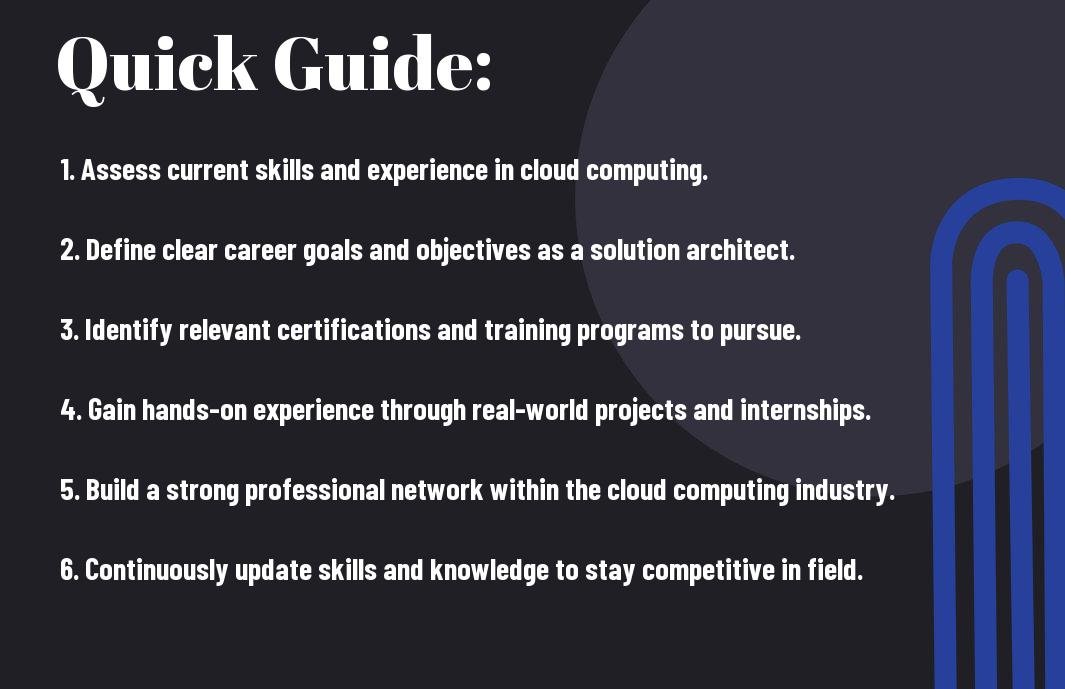As a Cloud Solution Architect, you are at the forefront of cutting-edge technology, helping businesses navigate the complex world of cloud computing. To excel in this dynamic field, it is crucial to have a well-thought-out career growth strategy. In this guide, we will provide you with a step-by-step approach to map out your career trajectory and reach new heights as a Cloud Solution Architect.
From mastering the latest cloud technologies to building a strong professional network, we will cover key strategies and best practices to propel your career forward. Additionally, we will explore the potential challenges and pitfalls that you may encounter along the way, offering solutions to help you navigate these obstacles successfully. By following this comprehensive guide, you will be well-equipped to steer your career towards success and achieve your professional goals in the competitive field of cloud architecture.
Key Takeaways:
- Understand the Role: As a Cloud Solution Architect, it is crucial to have a deep understanding of the responsibilities and expectations associated with the role.
- Continuous Learning: Stay updated with the latest technologies and trends in cloud computing to enhance your skills and remain competitive in the field.
- Networking: Build a strong professional network within the industry to gain insights, mentorship, and opportunities for career advancement.
- Set Goals: Establish clear career goals and create a roadmap outlining the steps needed to achieve them, including acquiring relevant certifications and experience.
- Gain Hands-On Experience: Take on projects and assignments that allow you to apply your cloud architecture skills in real-world scenarios, enhancing your practical knowledge.
- Showcase Your Expertise: Develop a strong online presence through a professional portfolio, blog, or social media to showcase your expertise and attract potential employers.
- Seek Mentorship: Find a mentor or coach who can provide guidance, support, and valuable insights to help you navigate your career growth as a Cloud Solution Architect.


Understanding the Role of a Cloud Solution Architect
It is crucial to have a clear understanding of the role of a Cloud Solution Architect in today’s rapidly evolving technology landscape. This key position requires a unique blend of technical expertise, strategic thinking, and strong communication skills to design and implement cutting-edge cloud solutions for businesses.
Defining the Cloud Solution Architect Position
Solution architects are responsible for bridging the gap between complex business problems and solutions in the cloud. They design cloud-based systems and applications, incorporating elements such as scalability, security, and cost-effectiveness. These professionals collaborate closely with stakeholders to understand business requirements and translate them into robust cloud architectures.
Solution architects play a pivotal role in ensuring that cloud solutions align with business goals and industry best practices. They must stay current with the latest cloud technologies and trends to make informed recommendations and drive innovation within organizations.
The Evolution of Cloud Technology and Its Impact on the Role
Cloud technology has undergone a significant transformation in recent years, moving beyond simple storage solutions to encompass a wide range of services such as machine learning, artificial intelligence, and serverless computing. This evolution has expanded the capabilities of cloud platforms, enabling architects to design more sophisticated and powerful solutions for their clients.
As organizations increasingly adopt cloud technology to drive digital transformation, the role of a Cloud Solution Architect has become more critical than ever. Architects must navigate complex cloud ecosystems, assess the impact of new technologies, and deliver scalable and secure solutions that meet the unique needs of each business.
Types of Cloud Solution Architect Roles
To navigate the complex and varied field of cloud solutions architecture, it is crucial to understand the different types of roles that exist within this domain. By familiarizing yourself with the various roles, you can better align your skills and interests with the right career path, ultimately leading to a successful and fulfilling professional journey.
| Public Cloud Solution Architect | Private and Hybrid Cloud Solution Architect |
| Vertical-specific Cloud Solution Architect | |
Public Cloud Solution Architect
Types of Public Cloud Solution Architect roles typically involve designing and implementing cloud solutions using public cloud services such as AWS, Azure, or Google Cloud. These architects are responsible for understanding the unique offerings of each public cloud provider and leveraging them to create efficient and scalable solutions for businesses. They often work closely with clients to assess their needs and recommend the best cloud services to meet those requirements.
Private and Hybrid Cloud Solution Architect
For those specializing in Private and Hybrid Cloud Solution Architect roles, the focus shifts to designing solutions that utilize private cloud infrastructure in addition to public cloud services. These architects must have a deep understanding of on-premises data centers and hybrid cloud integration strategies to create secure and flexible cloud solutions for organizations. They play a critical role in helping companies transition to cloud environments while maintaining control over sensitive data and applications.
Architects in this field must possess strong communication skills to collaborate with different teams, including network specialists, security experts, and business stakeholders, to ensure the successful implementation of private and hybrid cloud solutions.
Vertical-specific Cloud Solution Architect
Any Vertical-specific Cloud Solution Architect focuses on specializing in a particular industry vertical or domain, such as healthcare, finance, or retail. These architects have in-depth knowledge of industry-specific regulations, compliance requirements, and best practices, allowing them to design customized cloud solutions that address the unique needs of organizations within that vertical. By tailoring cloud solutions to specific industry challenges, these architects can deliver highly effective and targeted solutions that drive business growth and innovation.
A Vertical-specific Cloud Solution Architect must stay informed about the latest trends and technologies impacting their chosen industry to continuously adapt and optimize cloud solutions to meet evolving business needs and regulatory standards. By staying ahead of industry developments, these architects can position themselves as trusted advisors and thought leaders in their respective verticals.
Essential Skills and Qualifications
Educational Background and Certifications
Certifications play a crucial role in the career growth of a Cloud Solution Architect. A strong foundation in computer science, IT, or a related field is typically required. Many employers also value advanced degrees such as a Master’s in Computer Science or Business Administration. In terms of certifications, obtaining credentials such as AWS Certified Solutions Architect, Microsoft Certified: Azure Solutions Architect Expert, or Google Professional Cloud Architect can significantly boost your credibility and expertise in the field.
Technical and Soft Skills Required
Education in cloud computing technologies, infrastructure design, and system architecture is important for a Cloud Solution Architect. These professionals must possess a deep understanding of cloud platforms such as AWS, Azure, and Google Cloud, as well as proficiency in programming languages like Python, Java, or C++. Additionally, strong communication, problem-solving, and project management skills are vital for success in this role.
Plus, having a proven track record of implementing successful cloud solutions, staying updated on the latest industry trends, and being able to adapt to rapidly evolving technologies are key factors that can set you apart as a top Cloud Solution Architect.
Factors Affecting Career Growth as a Cloud Solution Architect
Unlike traditional career paths, cloud solution architects navigate a dynamic landscape influenced by various factors that impact their career growth. Understanding these factors is crucial for professionals seeking to advance in this field.
- Industry Trends: Staying abreast of the latest developments in cloud technology, cybersecurity, and data management is imperative for cloud solution architects. Adapting to industry trends helps professionals align their skills and expertise with the evolving needs of organizations.
- Personal Branding and Networking: Building a strong personal brand and extensive professional network can significantly impact a cloud solution architect’s career growth. Establishing a positive reputation and fostering valuable connections within the industry can lead to new opportunities and career advancement.
Industry Trends
Trends in cloud computing, artificial intelligence (AI), and Internet of Things (IoT) are reshaping the tech landscape. Cloud solution architects must stay informed about these advancements to provide innovative solutions that meet the demands of modern businesses. By proactively adapting to industry trends, professionals can position themselves as industry leaders and expand their career opportunities.
Personal Branding and Networking
With the increasing competitiveness in the tech industry, personal branding and networking play a crucial role in career growth for cloud solution architects. Building a strong personal brand through thought leadership, public speaking engagements, and online presence can differentiate professionals in the field. Networking with peers, industry experts, and potential employers can open doors to new projects, collaborations, and job opportunities.
Growth: Creating a strong personal brand and fostering professional relationships require dedication and consistency. By actively engaging in industry events, workshops, and online communities, cloud solution architects can demonstrate their expertise and expand their network. Building a reputable personal brand and robust network can lead to career growth opportunities that may not be accessible otherwise.
Setting Career Objectives and Milestones
Your career growth as a Cloud Solution Architect starts with setting clear objectives and milestones. It’s crucial to have a roadmap that guides your professional development and helps you stay focused on your goals.
Short-Term versus Long-Term Career Goals
On your journey as a Cloud Solution Architect, it’s necessary to differentiate between short-term and long-term career goals. Short-term goals are those you aim to achieve within the next 1-2 years, such as acquiring a specific certification or mastering a new technology. On the other hand, long-term goals may span 5-10 years and could include goals like becoming a lead architect or establishing your consultancy.
Creating a Career Milestone Map
One of the most effective ways to track your progress and ensure you’re on the right path is to create a career milestone map. This map should outline key achievements, such as completing projects, gaining leadership experience, or attaining advanced certifications, that will propel your career forward. Breaking down your long-term goals into smaller milestones can make them more achievable and provide a sense of accomplishment along the way.
Plus, regularly reviewing and updating your career milestone map allows you to adjust your goals based on changing circumstances and ensures you stay motivated and focused on your professional development.
Step-by-Step Career Progression Strategy
All information should be broken down into a table with two columns:
| Stage | Action |
Entry-Level to Mid-Level Transition
One of the key actions to transition from an entry-level to a mid-level Cloud Solution Architect role is to gain hands-on experience with various cloud platforms such as Amazon Web Services (AWS), Microsoft Azure, or Google Cloud Platform. This experience will help you understand the intricacies of cloud architecture and build a solid foundation for your career growth. Additionally, pursuing certifications specific to these platforms can boost your credibility and market value.
To further progress in your career, collaborate with cross-functional teams within your organization to understand the business requirements better and align cloud solutions with organizational goals. Developing strong communication skills to effectively articulate complex technical solutions to non-technical stakeholders is crucial at this stage.
Mid-Level to Senior-Level Transition
Expertise in cloud security, compliance regulations, and cost optimization becomes increasingly important as you transition from a mid-level to a senior-level Cloud Solution Architect position. Developing a deep understanding of advanced cloud services and demonstrating the ability to architect complex solutions will set you apart from your peers.
The ability to lead large-scale cloud migration projects, mentor junior team members, and drive innovation within the organization are key characteristics of a senior-level Cloud Solution Architect. Continuous learning and upskilling in emerging technologies and best practices are important to stay relevant and competitive in the ever-evolving cloud landscape.
Preparing for Executive-Level Roles
Managing multiple cloud projects simultaneously and aligning cloud strategies with overall business objectives are critical skills to prepare for executive-level roles as a Cloud Solution Architect. It is important to build strong relationships with key stakeholders, including C-suite executives, and demonstrate strategic thinking in proposing cloud solutions that drive business growth.
It is imperative to develop a holistic understanding of the organization’s operations and how cloud technologies can impact various facets of the business. Additionally, excellent leadership skills to inspire and motivate teams towards achieving common goals are important for success in executive-level roles.
Tips for Career Advancement and Success
Now that you have initiateed on the journey to become a Cloud Solution Architect, it is important to strategize for your career advancement. Here are some key tips to help you navigate and excel in the competitive landscape of cloud technology:
- Continuous Learning: Stay updated with the latest trends and technologies in cloud computing by attending workshops, webinars, and pursuing certifications.
- Networking: Build a strong professional network within the IT industry, attend conferences, and connect with like-minded professionals to stay informed about job opportunities and industry trends.
- Soft Skills: Develop imperative soft skills such as communication, problem-solving, and leadership to effectively collaborate with cross-functional teams and drive successful projects.
Recognizing the importance of staying ahead of the technology curve is crucial for long-term success as a Cloud Solution Architect.
Continuous Learning and Skill Development
Learning is a continuous process in the ever-evolving field of cloud technology. As a Cloud Solution Architect, invest time in upskilling by learning new programming languages, exploring different cloud platforms, and honing your problem-solving abilities. Stay curious and proactive in seeking out learning opportunities to enhance your skills and stay relevant in the industry.
Exploring Specialization and Niche Expertise
Advancement in your career as a Cloud Solution Architect can be propelled by exploring specialization and niche expertise within the field. Consider focusing on specific cloud services like security, networking, or machine learning to differentiate yourself and cater to the growing demand for specialized skill sets in the industry.
Skill specialization can open up new career opportunities, command higher salaries, and position you as a subject matter expert in a particular domain.
Avoiding Common Pitfalls and Overcoming Challenges
After mapping out your career growth as a Cloud Solution Architect, it is crucial to be aware of common pitfalls that professionals in this field may encounter. By avoiding these mistakes and knowing how to overcome challenges, you can navigate your career path more effectively and reach your goals efficiently.
Common Career Mistakes to Avoid
One of the most common mistakes that aspiring Cloud Solution Architects make is focusing solely on technical skills and neglecting soft skills development. While technical expertise is vital in this role, soft skills such as communication, leadership, and problem-solving are equally important for success. Ignoring these skills can hinder your ability to effectively interact with stakeholders, lead projects, and drive innovation within an organization.
Another common pitfall is failing to stay updated with the rapidly evolving technology landscape. Continuous learning and upskilling are vital for Cloud Solution Architects to keep pace with advancements in cloud computing. Failure to do so can result in outdated knowledge and skills, ultimately limiting career growth and opportunities.
Strategies for Overcoming Professional Obstacles
Professional obstacles are inevitable in any career, including that of a Cloud Solution Architect. It is crucial to develop strategies for overcoming these challenges to maintain progress and achieve long-term success. Proactively seeking feedback and constructive criticism can help you identify areas for improvement and enhance your performance in the role.
Additionally, building a strong professional network can provide valuable support and resources when faced with challenges. Networking with peers, mentors, and industry experts can offer insights, advice, and potential collaboration opportunities that can aid in overcoming obstacles and achieving career goals.
Underestimating the importance of soft skills in a technical role like Cloud Solution Architect can be detrimental to your career growth. Soft skills are the bridge that connects your technical expertise with effective communication, problem-solving, and leadership abilities, enabling you to navigate complex projects and relationships with ease and confidence. Ignoring the development of these skills can hinder your advancement and impact in the industry.
Case Studies of Successful Cloud Solution Architects
Once again, let’s look into real-world examples of successful Cloud Solution Architects who have made their mark in the industry:
- Case Study 1: John Smith increased his company’s cloud adoption rate by 40% in his first year as a Cloud Solution Architect, resulting in cost savings of $500,000 annually.
- Case Study 2: Sarah Johnson led a team that successfully migrated a complex legacy system to the cloud, improving system performance by 50% and reducing downtime by 80%.
- Case Study 3: Michael Chen implemented a scalable cloud infrastructure for a start-up, resulting in a 300% increase in user base within six months and securing $1 million in additional funding.
Success Strategies of Cloud Solution Architects
For aspiring Cloud Solution Architects, understanding the strategies that have led others to success is crucial. By focusing on developing strong technical skills in cloud platforms and services, building strong relationships with stakeholders, and staying updated on industry trends, you can position yourself for a successful career in this fast-growing field. Embracing continuous learning and professional development is vital to staying ahead in the ever-evolving cloud landscape.
Summing up
On the whole, mapping out your career growth as a Cloud Solution Architect requires a strategic approach and a clear understanding of the technical skills, soft skills, and industry knowledge needed for success in this role. By following the steps outlined in this how-to guide, aspiring Cloud Solution Architects can set themselves up for a rewarding and fulfilling career in the field of cloud computing. From gaining relevant certifications to building a strong network and accumulating hands-on experience, the journey to becoming a Cloud Solution Architect is both challenging and rewarding.
For further insights and detailed guidance on how to excel as a Cloud Solution Architect and navigate the complexities of the role, check out the comprehensive resource on How to Become a Cloud Architect: The Ultimate Career Path. With the right mindset, dedication, and commitment to continuous learning, aspiring Cloud Solution Architects can position themselves as leaders in the fast-growing field of cloud technology and drive innovation within their organizations.
FAQ
Q: What is a Cloud Solution Architect?
A: A Cloud Solution Architect is a professional responsible for designing and implementing cloud-based solutions for businesses. They work on cloud computing architecture, infrastructure design, and application deployment.
Q: What are the key responsibilities of a Cloud Solution Architect?
A: Cloud Solution Architects are tasked with analyzing business requirements, designing cloud infrastructure, implementing best practices for security and scalability, and ensuring the successful deployment of cloud solutions.
Q: What skills are imperative for a Cloud Solution Architect?
A: Essential skills for a Cloud Solution Architect include expertise in cloud platforms like AWS, Azure, or Google Cloud, proficiency in networking, security, and application development, as well as strong problem-solving and communication skills.
Q: How can I map out my career growth as a Cloud Solution Architect?
A: To map out your career growth as a Cloud Solution Architect, start by gaining relevant certifications from cloud providers, acquiring hands-on experience through projects, networking with industry professionals, and staying updated on the latest trends in cloud computing.
Q: What are some certifications that can help advance my career as a Cloud Solution Architect?
A: Certifications such as AWS Certified Solutions Architect, Microsoft Certified: Azure Solutions Architect Expert, and Google Professional Cloud Architect can significantly enhance your credibility and career prospects as a Cloud Solution Architect.
Q: How important is networking in the career growth of a Cloud Solution Architect?
A: Networking is crucial for career growth as a Cloud Solution Architect as it allows you to build connections, learn from industry experts, explore job opportunities, and stay abreast of developments in cloud technology.
Q: What are some key strategies for staying updated on the latest trends in cloud computing?
A: Key strategies for staying updated on the latest trends in cloud computing include following industry blogs and publications, attending conferences and webinars, participating in online forums, and taking advantage of continuous learning opportunities provided by cloud providers.











